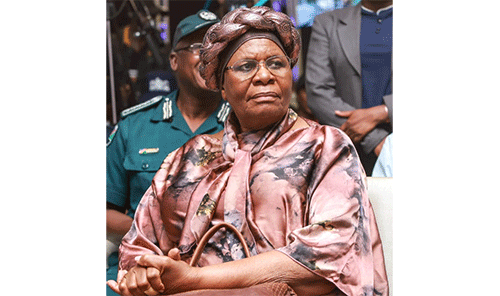For the first in the country’s post-independence history, Namibia has a female president-elect.
Her name is Netumbo Nandi-Ndaitwah, who was the ruling Swapo Party’s presidential candidate in the just-ended elections.
“Today, I’m saying to the Namibian people, as we have been telling you throughout the campaign, for us in the Swapo party and the team that I’m going to lead. We have made commitments. And I’m saying to you we are going to do what we have told you. Thank you for your trust and confidence in us,” she said in her acceptance speech on Tuesday.
The 72-year-old seasoned politician clinched to presidency with a 58% vote share, winning against her competitors, Panduleni Itula of the Independent Patriots for Change (IPC), who came second with 25.84% votes, and McHenry Venaani of the Popular Democratic Movement (PDM),
who is third on the presidential ballot with 5.04%. On the National Assembly ballot,
Swapo garnered majority votes of 53.38%, IPC obtained 20.21%, the Affirmative Repositioning (AR) has 6.61%, followed by PDM with 5.48%, and the Landless People’s Movement (LPM) with 5.21%.
The United Democratic Front of Namibia (UDF) has 1.54%, followed by the Namibia Economic Freedom Fighters (NEFF) with 1.07%, the Swanu got 1.05% and the Republican Party of Namibia (RP) got 1.00%.
Seats
In 2019, Swapo secured the presidency with 56.3%, a significant drop from the 87% it received in 2014.
The 58% it garnered in the recently-concluded elections represents a 2% increase compared to the 2019 results.
Swapo secured 51 of the 96 elected seats in the National Assembly, marking a decline of 12.
As a result, about nine sitting ministers have fallen short of being re-elected to Parliament under the party list system.
Several ministers are now facing uncertain political futures, namely Anna Nghipondoka, Erastus Utoni, Utoni Nujoma, Obeth Kandjoze, Christine //Hoebes, Frans Kapofi, Peya Mushelenga, Itah Kandji-Murangi and Tom Alweendo.
But if fortune favours them, they could be reinstated to Parliament if Nandi-Ndaitwah includes them in the list of eight people she has the authority to nominate to the National Assembly. On the other hand, IPC, who contested for the first time in the legislative chambers, scored 20 seats.
AR, the five-month-old party, scooped six seats. LPM and PDM got five seats each.
LPM has gained an extra seat, while PDM has 11 seats if the 2019 elections are anything to go by.
Contested poll
The 2024 Presidential and National Assembly elections, widely viewed as a watershed moment, have been defined not only by Nandi-Ndaitwah’s groundbreaking achievement but also a series of allegations and accusations of irregularities that have marred the electoral process.
In the aftermath of the announcement of the results, most parties, excluding Swapo and AR, boycotted the declaration.
In the past few days, various political parties jointly declared their dissatisfaction with the process and the alleged irregularities, vowing not to accept the outcome.
AR
Justifying his presence at the Electoral Commission of Namibia (ECN) on Tuesday, Amupanda said: “ECN belongs to us. All these institutions of State belong to us. So, once we stay away, we create an impression that it’s their space, and they can do whatever they want. That’s why they behave the way they do,” he said.
When asked whether he would take up the parliamentary seats allocated to his party or reject them like other parties, he said AR would determine its next steps.
“We don’t agree with these Zanu-PF election results. So, we are aggrieved by these Zanu-PF results. But, of course, we accept that we need to fight,” he remarked.
Amupanda remains hopeful for an election rerun.
“You can either win or lose. Of course, we hope that this rerun is the best option for Namibia,” he added.
Lesson
Speaking during the announcement of the results, the ECN chairperson Elsie Nghikembua said the journey has tested the resilience of the nation. “It reaffirmed the strength of our democracy, and reinforced the enduring spirit of the Namibian people. You will no doubt appreciate that conducting elections on a national scale is not only a complex process but also a huge responsibility,” she stated.
She admitted to the challenges the commission experienced, especially the main administrative and logistical challenges.
“The right course of action is to always address them promptly and in the best interest of the voters, democracy and the Namibian nation at large. In all our endeavours, the commission has at all times sought to respond to all emerging challenges in this spirit,” she said, adding that the feedback the commission has received from the stakeholders serves as input for future enhancement of the electoral process.
Statistics
For the presidential ballot, 1.1 million votes were cast, 1 099 582 were valid, and 14 552 rejected. On the National Assembly, the total votes cast are 1.1 million, of which 1 092 685 are valid votes and15 898 rejected votes. The ECN has initially registered 1.4 million eligible voters.



